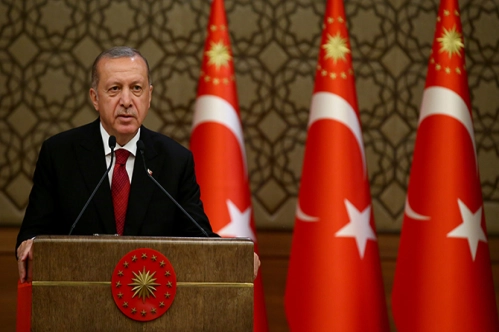- Son Dakika
- Gündem
- Ekonomi
- Finans
- Yazarlar
- Sektörel
- Dünya
- Kültür-Sanat
- Teknoloji
- FOTOĞRAF GALERİSİ
- VİDEO GALERİSİ
- e-Gazete
Gelişmelerden haberdar olmak için İstanbul Ticaret Haberleri uygulamasını indirin


The Presidential Government System officially began with President Recep Tayyip Erdoğan’s oath on July 9, 2018 at the Plenary Session of the Grand National Assembly of Turkey.
Turkey adopted a new government system with June 24 elections. The Presidential Government System, passed in a referendum in 2017, was stipulated to enter into force after the elections on June 24.
THE CABINET TO BE ESTABLISHED BY THE PRESIDENT
With the new administration system, the government will be established not in the parliament but within the presidency. The head of the government will no longer be the prime minister but the president. The election age of deputies dropped from 25 to 18, whereas the number of deputies increased from 550 to 600 with the new government model.
EFFECTIVE GOVERNMENT
The new government system will also have implications on the economy. An effective government model ensures rapid decision-making and those actions and reforms are decisive.
PARLIAMENT WILL PASS LAWS
The legislative (parliament) and executive (government) bodies will be strengthened with the presidential system. It will end the two-headed government system. The government will carry out the execution, the parliament will make laws and oversee the government. The parliament and government will be separated in a true meaning of the word. The nation will elect the parliament and the government and control them.
LEGISLATIVE PROPOSALS
Legislative proposals will be given by the deputies. The Assembly will check the elected president and his cabinet.
Because deputies will be in constant contact with their electorate, voters’ expectations will be reflected in a better way.
CONTRIBUTION TO GLOBAL PEACE
Strong government system will take Turkey to a more influential position in its region and global politics. It will also make greater contributions to regional and global peace and stability. As seen in the Operation Euphrates Shield in Syria, there will be greater opportunities in international cooperation and counter-terrorism. Turkey will assume a more effective and constructive role in resolving international issues.
DECREE AUTHORITY
In the Presidential Government System, the authority to issue a decree, now resting with the Council of Ministers, will be transferred to the President, acting as the single head of government. The president cannot issue decrees in the matters stipulated by the law.
When the decree contradicts the law, the provisions of the law apply. If the parliament issues laws on the same issue, the decree becomes invalid. Decrees are subject to the control of the parliament and the Constitutional Court.
YOUTH WILL ENTER THE PARLIAMENT
The youth’s point of view will be reflected more in politics as they will be able to gain political experience at an early age. The deputy election age will fall from 25 to 18.
STRUCTURAL TRANSFORMATION OF INSTITUTIONS
Administrative regulations related to institutions will be made by presidential decrees. Structural transformations of institutions and the integration of units or institutions undertaking similar tasks will become easier. Institutions required with new technologies and applications will be quickly created.
CHECK AND CRIMINAL LIABILITY
The president's "non-liability" is removed. In other words, he/she will no longer be "authorized but non-liable.” The president faces supervision and criminal liability. According to the current constitution, the president can be put on trial only on charges of treason and three-fourths of the vote of the parliament. The new system makes it possible to launch an investigation on the grounds of committing a crime. The president’s all acts and proceedings will become subject to judicial review.
NUMBER OF DEPUTIES TO INCREASE BY 50
The number of deputies will rise from 550 to 600, better suited to represent Turkey’s increasing population and giving citizens more representatives in their electoral areas.
PUTTING AN END TO BUREAUCRATIC DELAYS
The president will appoint and dismiss senior civil servants with decrees, putting an end to bureaucratic delays. It will enable changes regarding performance-based tasks to be undertaken in a much more swift fashion, allowing meritocracy come to the fore.
ELECTIONS TO BE HELD EVERY FIVE YEARS
Parliamentary elections will take place every five, rather than the current four year periods. Parliamentary and presidential elections will be held on the same day. This is aimed to decrease the possibility of early elections with the envision of uninterrupted five-year stabilization periods.